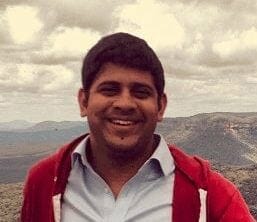Sathvik Tantry is the co-founder of FormSwift, a SaaS platform helping organizations go paperless. FormSwift’s tools allow businesses and individuals to create, edit, sign, and collaborate on documents and workflows in the cloud, eliminating unnecessary printing, faxing, and snail mail.
Where did the idea for FormSwift come from?
FormSwift was born because my co-founder, David, and I were both independent contractors and had to fill out a staggering number of commonly used forms by hand. We wanted a simple solution to create, complete, edit, and save any form — from W-2s to independent contractor agreements — from start to finish.
What does your typical day look like, and how do you make it productive?
I typically divide up my day into two-thirds “structured time” and one-third “unstructured time.” I use the structured time to focus on core business activities such as people management, financial planning, and evaluating tactical initiatives for customer acquisition. I spend the remaining time on any activities that need my immediate attention, such as product strategy, hiring, or strategic partnerships.
I also try to minimize unnecessary meetings, but I do hold a weekly one-on-one with each of my direct reports to resolve bottlenecks, set priorities, and work on professional development.
How do you bring ideas to life?
We have a product strategy meeting once a quarter to evaluate what needs to be done, then the product management team takes it from there. Ultimately, it’s about setting the strategic vision for the business, then hiring the best people to execute on building that vision for you.
What’s one trend that really excites you?
Making the world paperless. Big-box office supply stores make billions of dollars selling expensive, environmentally unfriendly paper. Software like ours can go a long way toward saving time and money while reducing our carbon footprint.
What is one habit of yours that makes you more productive as an entrepreneur?
Continually reassessing what’s important. In a fast-growing company, things are always changing. What made sense three months ago might not make sense now. The biggest mistake an entrepreneur can make is to be dogmatic. It’s important to be flexible and admit that you’ve made a mistake or that times have changed.
What was the worst job you ever had, and what did you learn from it?
I previously worked for a vice president of marketing who had no understanding of the digital marketing space. The big lesson there was that you shouldn’t hire someone just because he has a good résumé — you need to evaluate whether he’s a good fit for that specific role in your specific business. Don’t try to “pretty up” your team with fancy degrees and 20 years of experience just because it will impress investors or a board of directors. The potential downside in terms of morale and cultural decay is far too great.
If you were to start again, what would you do differently?
I would have made key hires earlier in the process. I tried to do everything myself initially, and that was a big mistake. You can only scale up if you delegate, and in many cases, other people can do the job far better than you can.
As an entrepreneur, what is the one thing you do over and over and recommend everyone else do?
I meditate every day. There’s always something going wrong, but you need to stay calm because the entire team is looking to you for direction. The worst thing you can do is break down in front of your team.
What is one strategy that has helped you grow your business?
Focusing on one acquisition strategy at a time. You’ll have much more success scaling up something that works — like paid acquisition or outbound sales — than trying lots and lots of things and going in circles. At FormSwift, we focused intensely on paid acquisition at first, and we only moved on to other opportunities once we had gotten to a steady state.
What is one failure you had as an entrepreneur, and how did you overcome it?
I missed out on a couple of key hires largely because I wasn’t able to communicate our vision effectively and they didn’t see FormSwift as solving a big problem. Since then, I’ve spent a lot of time honing our messaging and constantly “selling” key potential hires even before we’ve made them an offer.
Tell us something about you that very few people know?
I’m an amateur stand-up comedian.
What software and web services do you use? What do you love about them?
We use more than 50 SaaS products to run our business, including:
• Zenefits, which helps us set up benefits for our employees.
• Chargify, which allows us to process payments and collect customer data.
• New Relic, which allows us to quickly diagnose IT issues.
What is the one book that you recommend our community should read and why?
“Traction,” by Gabriel Weinberg and Justin Mares is the best book I’ve read on how to think about scalable customer acquisition.
What people have influenced your thinking and might be of interest to others?
• Ben Horowitz publishes the best management posts out there.
• Andrew Chen’s commentary on viral loops has impacted my views on user adoption.
• Fred Wilson’s early-stage venture capital blog, AVC, publishes great posts about thinking through the market.
Connect:
Vik Tantry on Twitter: @viktantry
Mario Schulzke is the Founder of ideamensch, which he started a decade ago to learn from entrepreneurs and give them a platform for their ideas.

